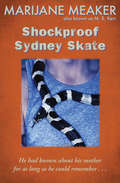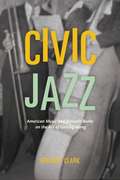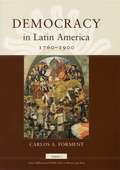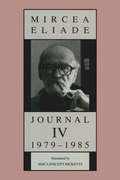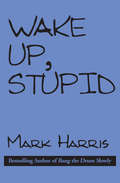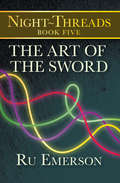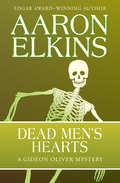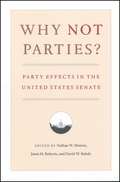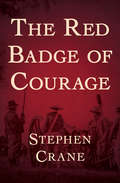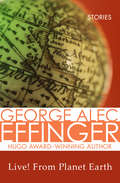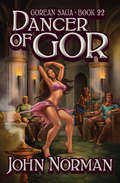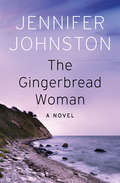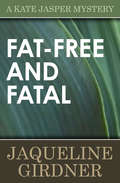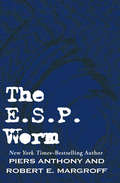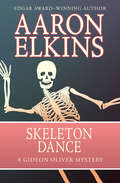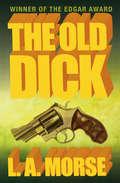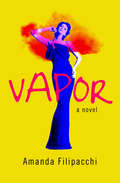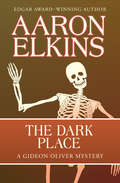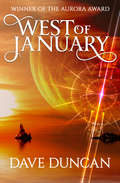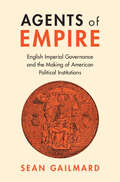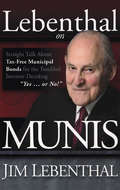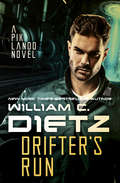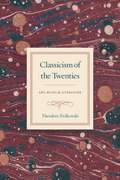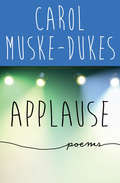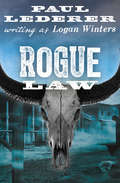- Table View
- List View
Shockproof Sydney Skate
by Marijane Meaker M. E. KerrA uniquely witty novel exploring sex, freedom, and the process of growing upSydney Skate considers himself shockproof. For as long as he can remember, he&’s known that his fashionable Manhattan mother is secretly a lesbian, although he&’s never let on that he knows. He spends his summer days caring for snakes at the local pet shop before leaving for college at Cornell, shrugging off his father&’s demands that he skip college and join the exciting world of swimming pool sales for suburbanites.Far from throwing himself into work, Sydney can&’t seem to keep his thoughts from wandering to women. He has memorized the sex scenes of every book he&’s ever read in order to better seduce the opposite gender. When he&’s called to help remove a snake from a bathtub that belongs to the gorgeous and sophisticated Alison Gray, everything changes. But nothing could prepare him for his glamorous mother sweeping the girl of his dreams off her feet.This hypnotizing coming-of-age story captures the timeless ecstasies and struggles of adolescence, and has been a classic of lesbian literature since it was first published in 1973. Hailed as the Catcher in the Rye of the seventies, Shockproof Sydney Skate exposes the confusion of its time and remains keenly relevant to the sexual absurdities of today.This ebook features an illustrated personal history of Marijane Meaker including rare images from the author&’s collection.
Civic Jazz: American Music and Kenneth Burke on the Art of Getting Along
by Gregory ClarkJazz is born of collaboration, improvisation, and listening. In much the same way, the American democratic experience is rooted in the interaction of individuals. It is these two seemingly disparate, but ultimately thoroughly American, conceits that Gregory Clark examines in Civic Jazz. Melding Kenneth Burke’s concept of rhetorical communication and jazz music’s aesthetic encounters with a rigorous sort of democracy, this book weaves an innovative argument about how individuals can preserve and improve civic life in a democratic culture. Jazz music, Clark argues, demonstrates how this aesthetic rhetoric of identification can bind people together through their shared experience in a common project. While such shared experience does not demand agreement—indeed, it often has an air of competition—it does align people in practical effort and purpose. Similarly, Clark shows, Burke considered Americans inhabitants of a persistently rhetorical situation, in which each must choose constantly to identify with some and separate from others. Thought-provoking and path-breaking, Clark’s harmonic mashup of music and rhetoric will appeal to scholars across disciplines as diverse as political science, performance studies, musicology, and literary criticism.
Democracy in Latin America, 1760–1900: Civic Selfhood and Public Life in Mexico and Peru (Morality And Society Ser. #1)
by Carlos A. FormentCarlos Forment's aim in this highly ambitious work is to write the book that Tocqueville would have written had he traveled to Latin America instead of the United States. Drawing on an astonishing level of research, Forment pored over countless newspapers, partisan pamphlets, tabloids, journals, private letters, and travelogues to show in this study how citizens of Latin America established strong democratic traditions in their countries through the practice of democracy in their everyday lives. This first volume of Democracy in Latin America considers the development of democratic life in Mexico and Peru from independence to the late 1890s. Forment traces the emergence of hundreds of political, economic, and civic associations run by citizens in both nations and shows how these organizations became models of and for democracy in the face of dictatorship and immense economic hardship. His is the first book to show the presence in Latin America of civic democracy, something that gave men and women in that region an alternative to market- and state-centered forms of life. In looking beneath institutions of government to uncover local and civil organizations in public life, Forment ultimately uncovers a tradition of edification and inculcation that shaped democratic practices in Latin America profoundly. This tradition, he reveals, was stronger in Mexico than in Peru, but its basic outlines were similar in both nations and included a unique form of what Forment calls Civic Catholicism in order to distinguish itself from civic republicanism, the dominant political model throughout the rest of the Western world.
Journal IV: 1979–1985
by Mircea EliadeJournal IV is the first publication, in a translation from the Romanian manuscript, of the journal that Mircea Eliade kept during the last seven years of his life. In this period, Eliade is ensconced as a famous scholar—his works are being translated into many languages and books about him arrive regularly in the mail. His encounters with scholars of like repute are recorded in the journal; after a party in Paris, Eliade shares a taxi with Claude Lévi-Strauss and inadvertently makes off with his raincoat. Running like a fault line through the peak of his success, however, is Eliade's painful awareness of his physical decline—failing vision, arthritic hands, and continual fatigue. Again and again he repeats how little time he has to finish the projects he is working on—his autobiography, the third and fourth volumes of his History of Religious Ideas, and the duties associated with his editorship of the Encyclopedia of Religion. He poignantly recounts the sharpest blow: the disorganization and eventual destruction by fire of his personal library. Within the scope of Journal IV Eliade and his world go to ruin. What does not decline is the vivid and persistent voice of Eliade the writer, an unbreaking voice that—with death only months away—plans a reply to critics, plots out an article, and ruminates on characters to people another novella.
Wake Up, Stupid
by Mark HarrisOriginally written in 1959, this is the hilariously explosive account of Youngdahl, a novelist, playwright, ex-Mormon, and father of seven. He is a frenzied man who is beginning a letter-writing campaign to escape his curiously ironic situation, and, of course, his profession. Along with Abner Klang, his not-so-literary agent who seems to have misplaced the F key on his typewriter, Youngdahl joins forces with a Mormon bishop, a TV adapter, and a prizefighter, among others, to spearhead a comic revolution.
The Art of the Sword (Night-Threads #5)
by Ru EmersonThe author of the Xena Warrior Princess tie-in books continues her Night-Threads series with a novel of a sword-wielding woman&’s quest to save Rhadaz. The kingdom of Rhadaz has fallen under a dark and deadly shadow, with Chris searching for its magical source. What he gets is more than he bargained for in a willful young woman who has mastered the art of the sword. Her name is Ariadne, a dark beauty with the coil of a cobra and eyes filled with distrust. Reluctantly joining forces, the two of them forge ahead to do battle with Zero, the addictive, dangerous drug that has taken command of Rhadaz. But can they defeat its ruthless overlord, one who has a shocking tie to Ariadne? Don't miss the entire "Night-Threads" Series: The Calling of the Three, The Two in Hiding, One Land One Duke, The Craft of Light, The Art of the Sword, and The Science of Power
Dead Men's Hearts: 27c Disp (The Gideon Oliver Mysteries #8)
by Aaron ElkinsEdgar Award–winning author: &“A cunning plot, a remarkably appealing hero, some uproariously funny dialogue . . . a winning combination.&” —Booklist An ancient skeleton tossed in a garbage dump is the first conundrum to rattle Gideon Oliver when he arrives in Egypt. There to appear in a documentary film, he expects an undemanding week of movie star treatment and a luxurious cruise up the Nile with his wife, Julie. But when Gideon discovers a tantalizing secret in the discarded bones—and violence claims a famous Egyptologist&’s life—he is thrust into a spotlight of a different kind. Plying his calipers as the world&’s foremost forensic anthropologist, Gideon&’s investigation of the goings‑on leads him through the back alleys and bazaars of Cairo and deep into the millennia‑old tombs of the Valley of the Kings. As the puzzle is painstakingly pieced together, Gideon will find that the identifying traits of a cunning killer are the same now as they were in the time of the pyramids: greed without guilt, lies without conscience . . . and murder without remorse. Dead Men&’s Hearts is the 8th book in the Gideon Oliver Mysteries, but you may enjoy reading the series in any order.
Why Not Parties?: Party Effects in the United States Senate
by Nathan W. Monroe, Jason M. Roberts and David W. RohdeRecent research on the U.S. House of Representatives largely focuses on the effects of partisanship, but the strikingly less frequent studies of the Senate still tend to treat parties as secondary considerations in a chamber that gives its members far more individual leverage than congressmen have. In response to the recent increase in senatorial partisanship, Why Not Parties? corrects this imbalance with a series of original essays that focus exclusively on the effects of parties in the workings of the upper chamber. Illuminating the growing significance of these effects, the contributors explore three major areas, including the electoral foundations of parties, partisan procedural advantage, and partisan implications for policy. In the process, they investigate such issues as whether party discipline can overcome Senate mechanisms that invest the most power in individuals and small groups; how parties influence the making of legislation and the distribution of pork; and whether voters punish senators for not toeing party lines. The result is a timely corrective to the notion that parties don’t matter in the Senate—which the contributors reveal is far more similar to the lower chamber than conventional wisdom suggests.
The Red Badge of Courage: An Episode Of The American Civil War
by Stephen CraneThe finest novel of the Civil War, and one of the greatest battle stories ever toldThe question of courage enters Henry Fleming&’s mind the moment he dons the blue uniform of the Union Army. But his first firefight reveals the emptiness of words such as bravery and fear. Pinned in by his comrades, he can only fire his rifle like a cog in a machine. There is no chance to run.Then comes the true test. Waking from a nap, Henry sees the enemy advancing once again. Gripped by an unshakable terror, he flees—from his regiment, from duty, from everything he wanted to believe about himself. A corpse bears witness to his shame.The nightmare has come true. Henry Fleming is a coward. Only one thing can save him now: a visible wound, the red badge of courage. With his regiment&’s colors in hand, Henry looks the enemy in the eye—and charges.Stephen Crane was born six years after Lee&’s surrender at Appomattox and had yet to see a battlefield when he wrote The Red Badge of Courage. Nevertheless, the novel is widely regarded as one of the most realistic depictions of war ever published, and a masterpiece of American literature.This ebook has been professionally proofread to ensure accuracy and readability on all devices.
Live! From Planet Earth: Stories
by George Alec EffingerThe Hugo Award–winning author&’s &“most memorable short stories . . . a tribute from those who best knew his work—his friends, fellow writers, and editors&” (SFRevu). George Alec Effinger was a true master of satirical Science Fiction. Before his death in 2002, he gained the highest esteem amongst his peers for his pitch-perfect stylistic mimicry and his great insight into the human condition. Despite a life filled with chronic illness and pain, Effinger was a prolific novelist and short story writer, earning multiple Nebula and Hugo Award nominations. LIVE! FROM PLANET EARTH represents a very special look at the many works of this unique genius. These 22 short pieces have been specifically selected and introduced by his fellow writers and editors, from Michael Bishop to Jack Dann, Mike Resnick to Neil Gaiman. Each writes about his or her memories of Effinger and his legacy. Included are &“The Aliens Who Knew, I Mean, Everything&” in which Earth is visited by benevolent aliens who happen to have annoying opinions about everything. &“Everything but Honor&” goes along as a black physicist time-travels to 1860 to murder a Civil War general. Also included here are Effinger&’s O.Niemand stories, which perfectly mimic the styles of Steinbeck, Hemingway and Twain. The results are a tour de force sure to please existing fans and make new fans of anyone who reads them.
Dancer of Gor (Gorean Saga #22)
by John NormanA shy librarian from Earth learns her true female nature as a slave dancer on the planet Gor in this fantasy series where men dominate women. Doreen Williamson is a quiet, shy librarian on Earth. Like many other young women, she is distrustful of her attractions, frightened of men, introverted in manner and sexually inhibited. She lives within a quiet, lonely, dissatisfying, sheltered, and frustrated desperation, distant from her true self, her nature denied, her only friends books and her secret thoughts. In the realization and enactment of a profound fantasy, after acute self-conflict, she dares to study a form of dance in which she is at last free to move her body as a female, a form of dance in which she may revel in her beauty and womanhood, a form of dance historically commanded by masters of selected, suitable slaves: belly dance. She must then dance, for the first time, before men. In doing so, she discovers her own desirability and that she may be well bid upon. Rediscover this brilliantly imagined world where men are masters and women live to serve their every desire. Dancer of Gor is the 22nd book in the Gorean Saga, but you may enjoy reading the series in any order.
The Gingerbread Woman: A Novel
by Jennifer JohnstonA powerful novel, by one of Ireland&’s preeminent writers, of two damaged people and their fateful, restorative friendship For Laurence, trauma came in the form of a random act of violence that claimed his wife and daughter a decade ago. For Clara, it was something she has kept hidden, confined to her own memory and unknown to those closest to her. By chance, they meet atop a cliff overlooking Dublin Bay, where Laurence finds Clara standing uncomfortably close to the edge. Days later they encounter each other again, this time at a pub, and begin a tentative friendship rooted in their kindred heartbreak. Through conversations at once witty, somber, and cuttingly honest, they find a soothing sense of connection and respite from their own lonely grieving. Poignant and engrossing, The Gingerbread Woman is a stirring novel of love and mourning, and of the unlikely friendship that leads two broken people toward a renewed sense of hope.
Fat-Free and Fatal (The Kate Jasper Mysteries #4)
by Jaqueline GirdnerKate Jasper, Marin County, California&’s own organically grown amateur sleuth, returns in this fourth mystery in the series.Kate and her new sweetie have finally moved in together in Fat-Free and Fatal. But her sweetie&’s venomous mother has moved in, too, and she is working hard at destroying the relationship. Kate signs up for a vegetarian cooking class to get out of the house and out from under the prongs of her almost mother‑in‑law&’s tongue. Only it is a case of out‑of‑the‑frying‑pan‑into‑the‑fire when the owner of the class&’s venue, the Good Thyme Cafe, is found dead . . . strangled by the electric cord of a SaladShooter. The police suspect Kate&’s best friend, Barbara. Kate sleuths, fearing that otherwise, her friend&’s fowl‑free goose may be cooked.
The E. S. P. Worm
by Piers Anthony Robert E. MargroffA slimy, telepathic alien throws the universe into chaos in this science fiction classic cowritten by the New York Times–bestselling author. The cast of cosmic characters: A prodigal worm, a telepathic, egotistical, totally unscrupulous little alien running away from his father becomes the biggest prize in the universe. Capture the slimy brat and win an entire planet! A cosmic hustler, an effete snob who ekes out a comfortable living as the president&’s son-in-law and perfects his reflexes with endless contests of cosmic pool, becomes the most important element in a delicate game of interspatial espionage—and the galaxy&’s prime target for assassination. The most sensual woman on Earth, completes the star-crossed triangle in one of the wildest, wickedest romps in the annals of science fiction!
Skeleton Dance (The Gideon Oliver Mysteries #10)
by Aaron ElkinsThe French police call on the Skeleton Detective when a dog digs up some human bones: &“Terrific&” —Publishers Weekly Les‑Eyzies‑de‑Tayac is known for three things: pâté de fois gras, truffles, and prehistoric remains. The little village, in fact, is the headquarters of the prestigious Institute de Préhistoire, which studies the abundant local fossils. But when a pet dog emerges from a nearby cave carrying parts of a human skeleton—by no means a fossilized one—Chief Inspector Lucien Anatole Joly puts in a call to his old friend, Gideon Oliver, the famed &“Skeleton Detective.&” Once Gideon arrives, murder piles on murder, puzzle on puzzle, and twist follows twist in a series of unexpected events that threaten to tear the once sober, dignified Institut apart. It takes a bizarre and startling forensic breakthrough by Gideon to bring to an end a trail of deception thirty‑five thousand years in the making. Skeleton Dance is the 10th book in the Gideon Oliver Mysteries, but you may enjoy reading the series in any order.
The Old Dick
by L. A. MorseWINNER OF THE EDGAR AWARD FOR BEST PAPERBACK ORIGINAL. --- Retired private eye Jake Spanner may have gotten old, but he hasn&’t gone soft. When an old gangster Jake put away some forty years ago shows up at his door, it&’s time for Jake to grab his hat and Browning automatic and get back to work. Old? Sure. Slower to catch his breath? Maybe. But, sharp as a tack and with a lifetime of investigating know-how, Jake Spanner has nothing to lose and everything to prove. Sniffing out leads between Sunset Boulevard and the Hollywood Hills, Jake pulls in old friends to help. The work is hard; it&’s gritty. So is Jake. And, with a three quarters of a million dollars ransom at stake, the bad guys don&’t stand a chance. With THE OLD DICK, author L.A. Morse creates a new kind of hero, one that laughs at death not because he&’s too young to understand it, but because it&’s right around the corner. It&’s time to face it head on and maybe go out swinging.
Vapor: A Novel
by Amanda FilipacchiThe Pygmalion myth recast by one of America&’s boldest and most bewitching storytellersAnna Graham has one ambition—to be a great actress. The only problem is, she can&’t stop being herself. She is proud, stubborn, and moody; according to her acting teacher, she needs to be as bland and pliable as warm wax. Even when she rents a Good Fairy Queen Costume—complete with crown, wand, and wig—and walks the streets of New York City until three thirty in the morning, she fails to be anyone but Anna Graham. &“Help,&” she thinks, smoking a cigarette in a deserted subway station. &“Help!&” screams a man at the other end of the platform as two attackers pull him onto the train tracks. Red pepper spray in hand, the Good Fairy Queen rushes to Damon Wetly&’s rescue—and Anna&’s wish comes true, in the oddest way imaginable.Locked inside a cage in Wetly&’s cloud-filled country home, Anna learns to do everything—walk, talk, think, eat, breathe—differently. When she finally escapes, she becomes a star—as Wetly promised she would. The new-and-improved Anna attracts plenty of admirers—including a paraplegic soap opera celebrity; the world&’s most famous supermodel; and a handsome cellist, Weight Watchers counselor, etiquette expert, and exotic dancer named Nathaniel Powers—but she only has eyes for her former captor, the creator of miniature clouds and major actresses. Just when it seems that her fairy tale ending is right around the corner, Anna&’s whole world threatens to evaporate into thin air.Fearless and fascinating, Vapor holds a funhouse mirror up to some of our deepest and most alluring notions about fame, identity, and desire.
The Dark Place (The Gideon Oliver Mysteries #2)
by Aaron ElkinsGideon Oliver earns his moniker &“The Skeleton Detective&” in this riveting entry to the Edgar Award–winning mystery series &“that never disappoints&” (The Philadelphia Inquirer) Deep in the primeval rainforest of Washington State&’s Olympic Peninsula, the skeletal remains of a murdered man are discovered. And a strange, unsettling tale begins to unfold, for forensic anthropologist Gideon Oliver determines that the murder weapon was a primitive bone spear of a type not seen for the last ten thousand years. And whoever—or whatever—hurled it did so with seemingly superhuman force. Bigfoot &“sightings&” immediately crop up, but Gideon is not buying them. But something is continuing to kill people, and Gideon, helped by forest ranger Julie Tendler and FBI special agent John Lau, plunges into the dark heart of an unexplored wilderness to uncover the bizarre, astonishing explanation. Fans of authors Kathy Reichs and Tess Gerritsen and television shows like Bones will be fascinated by Aaron Elkins&’s award-winning landmark forensic detective series. The Dark Place is the 2nd book in the Gideon Oliver Mysteries, but you may enjoy reading the series in any order.
West of January
by Dave DuncanThe Aurora Award–winning novel of a remote far-future world caught in a cycle of destruction, from the author of the Seventh Sword saga. On the distant planet of Vernier, a single day lasts an eternity. Lifetimes pass before a region fully experiences dawn, midday, and dusk. With each new daybreak comes a new generation, with no memory of the catastrophes that occurred when the sun crawled across the sky—entire civilizations scorched into oblivion. Only Vernier&’s &“angels&” possess the ancient knowledge to preserve past technologies that will save the world&’s population from the ruthless cycle of destruction. Knobil was born during the west of January among the herdsmen, a primitive culture in which the men fight to the death to preserve their own lineage. He is also the son of an &“angel,&” who left him the means to enter Heaven. It is an odyssey that will take Knobil among all the other peoples of his world—the beautiful but unthinking seafolk, the cruel slavers, the manipulative traders, the secretive spinsters—to a destiny he may die before embracing at the far end of December. Of epic scope, this is a novel of the struggle for survival in a hostile environment from the author of The Reluctant Swordsman and Portal of a Thousand Worlds, &“an expert at producing page-turning adventure&” (Locus).
Agents of Empire: English Imperial Governance and the Making of American Political Institutions
by Sean GailmardTo understand the foundations of American political institutions, it's necessary to understand the rationale for British colonial institutions that survived the empire. Political institutions in England's American colonies were neither direct imports from England, nor home-grown creations of autonomous colonists. Instead, they emerged from efforts of the English Crown to assert control over their colonies amid limited English state and military capacity. Agents of Empire explores the strategic dilemmas facing a constrained crown in its attempts to assert control. The study argues that colonial institutions emerged from the crown's management of authority delegated to agents-first companies and proprietors establishing colonies; then imperial officials governing the polities they created. The institutions remaining from these strategic dynamics form the building blocks of federalism, legislative power, separation of powers, judicial review, and other institutions that comprise the American polity today.
Lebenthal on Munis: Straight Talk About Tax-free Municipal Bonds For The Troubled Investor Deciding Yes... Or No!
by Jim LebenthalIF YOU KNEW WHAT I KNOW... Would you buy a municipal bond for the subways in New York City that&’s rated AA-, or only A? Would you care what a bond is for as long, as it&’s a general obligation backed by the issuer&’s full faith, credit, and taxing power? Would you pay 109 for a bond, a premium of $90 for every $1,000 face value, knowing you&’re going to get back only $1,000 at the end??Would it be crazy to buy a 30-year bond at age 80? Would you read &“these bonds are not a debt of the state&” as a fair warning, Buyer Beware??Tax free municipal bonds. Would you buy them at all? STRAIGHT TALK FROM THE MAN WHO PUT MUNIS ON THE MAP FOR THE INDIVIDUAL INVESTOR. Would telling you the whole story about investing in municipal bonds, and making sure you know the risks involved, kill the sale? &“I&’ll take my chances,&” says Jim (Municipal Bonds Are My Babies) Lebenthal. For 45 years, Jim Lebenthal wrote and starred in the Lebenthal family&’s municipal bond business commercials - information nuggets that educated the public and turned munis into a household word, wherever his face and voice were seen and heard. Outraged by what Wall Street had done to the financial markets with reckless abandon, and Bernie Madoff with malice aforethought, Jim gives equal time in Lebenthal On Munis…Deciding, "Yes…" or "No!" to the Whys and Why Nots for investing in his "babies." "Balancing the heady appeal of tax exemption with the payment record of municipal bonds in the Depression and the volatility of resale prices during the inflation tortured '70s and '80s, isn&’t optional for a broker," says Lebenthal. "Full Disclosure is the law." In Lebenthal on Munis, Jim carries out that law, even if Full Disclosure means turning Jim and his babies, thumbs down. DECIDING, "YES…" OR "NO!"
Drifter's Run (Pik Lando #2)
by William C. DietzA smuggler goes on the lam in space in this fast-paced adventure by the New York Times–bestselling author of Halo: The Flood. Even smuggling has rules. The second is: Don&’t let your guard down. Meet Pik Lando, a con artist and a ladies man, a total professional who&’ll chase across the galaxies for his clients—and he&’ll usually find plenty of action and danger too. In Drifter&’s Run, he takes a job piloting a space tug, figuring he could lay low from a cyborg hell bent on finding you. Suddenly Lando is too popular—the government wants his head and a beautiful bounty hunter wants his body. So much for life as fugitive. Don&’t miss Lando&’s other adventures, Drifter and Drifter&’s War.
Classicism of the Twenties: Art, Music, & Literature
by Theodore ZiolkowskiThe triumph of avant-gardes in the 1920s tends to dominate our discussions of the music, art, and literature of the period. But the broader current of modernism encompassed many movements, and one of the most distinct and influential was a turn to classicism. In Classicism of the Twenties, Theodore Ziolkowski offers a compelling account of that movement. Giving equal attention to music, art, and literature, and focusing in particular on the works of Stravinsky, Picasso, and T. S. Eliot, he shows how the turn to classicism manifested itself. In reaction both to the excesses of neoromanticism and early modernism and to the horrors of World War I—and with respectful detachment—artists, writers, and composers adapted themes and forms from the past and tried to imbue their own works with the values of simplicity and order that epitomized earlier classicisms. By identifying elements common to all three arts, and carefully situating classicism within the broader sweep of modernist movements, Ziolkowski presents a refreshingly original view of the cultural life of the 1920s.
Applause: Poems
by Carol Muske-DukesNational Book Award finalist Carol Muske-Dukes explores joy, dread, and the solitary communion of applauseApplause provides twenty vivid and evocative poems by Carol Muske-Dukes. In &“Dream,&” she seeks the past in reverie, along with bicoastal riffs on New York City and Los Angeles. &“The Eulogy&” paints the scene of a funeral in sunny California where a young man who has died of AIDS is laid to rest. In the title poem, a twelve-part journey through the ritual of applause, Muske-Dukes examines the power of a gesture—clapping—to transform oneself from individual to communal. &“What a strange phenomenon,&” she says, &“to be single and plural at once, to feel joy and dread simultaneously, to wish to acknowledge publicly one&’s anonymity.&”
Rogue Law
by Paul LedererRun off his land, a rancher is forced to take the most dangerous job in town: marshalJulius Lang is chatting with the marshal when the killers ride down Main Street, and he doesn&’t have time to reach for his gun before a storm of bullets cuts the lawman down. This is the fourth marshal Montero has lost this year, and the townspeople want Lang to be the fifth. He&’d rather return to the safety of his failing ranch, but when a brassy young San Francisco woman comes and claims his land as her own, he&’s left with no choice but to take the badge—and be measured for a coffin along with it.The killers who run this town expect Lang to be just another pushover, but he&’s ready to surprise them. This rancher has lost everything, and he will kill to get it back.
